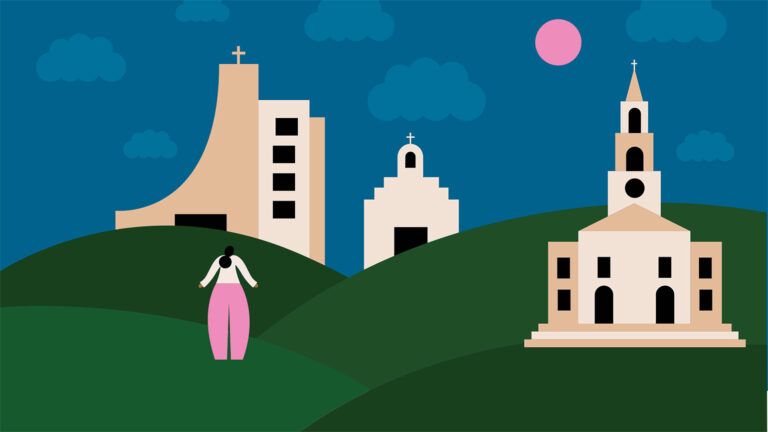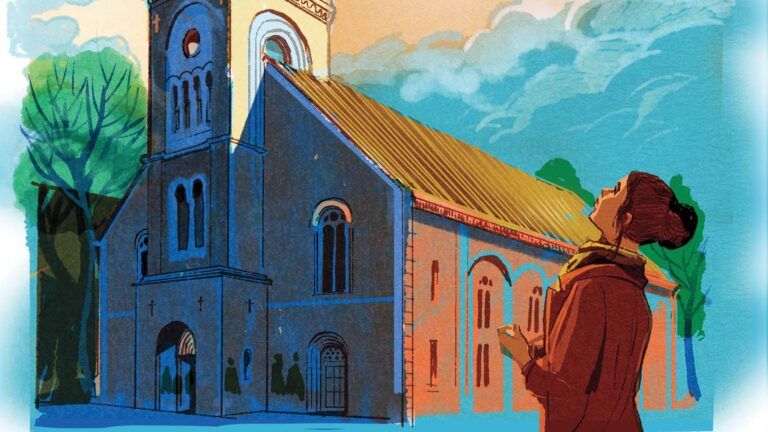The rubber band around the envelope was desiccated; the inscription on the tired yellow paper was in Mom’s clear, steady hand: “Letters of Importance from Joe W. Varner.” Joe was my father. Along with everything else in this safe-deposit box, the envelope came to me when my mother died in 1957, yet in the last half century I had never opened it. I assumed that the letters concerned official matters relating to my parents’ divorce, something to which even now at the age of 81, I am not entirely reconciled. All these years later, the pain feels fresh every time I think about it.
I was five at the time. We lived in Louisville, Kentucky. I cried and cried when I was told that Dad would no longer be living with us. We were a family: Mom and Dad, my two brothers and I—Ham the oldest, JoJo the youngest and me in the middle. To my way of thinking, the family was indivisible. Everything I was taught in Sunday school reinforced that conviction. And I refused to believe that Mom and Dad were not a loving pair. Hadn’t God brought them together? Didn’t that mean their love was perfect? It must!
Even today, on a wall in my apartment, I keep a photograph of their wedding. What a splendid affair it was. The wedding party is dining, coiffed and dressed in 1919 fashion, and the huge round table, strewn with flowers, glows with lighted candles. Guests converge on the newly married couple: “Aunt” Lucy and Granduncle Ferd and “Aunt” Lillian. Mom responds to one group laughingly as Dad banters with another. All are rejoicing, for smiles abound and congratulatory hands are raised. Even Mom’s little white dog, Fluff, joins in the chorus.
The wedding was held on the cusp of the twenties, a decade of buoyant living, of drinking, of loosening morals and marital bonds. Dad was nothing if not carefree. “Your father has always been a boy,” Mom said once. “He has never grown up.”
That was true. He was a jokester, ever ready to go to a ball game or to set forth with his beloved shooting irons in search of quail. He was youthfully slender all his life (when he died at the age of 53, his suits, without any alteration, fit me, age 26) and both men and women loved him, especially the women. Women were the cause of the trouble, I later surmised, and alcoholism. The divorce hit Dad so hard that he never took another drink. Women were another matter.
Life after the divorce wasn’t as bad as I had dreaded. Dad came out to the house every day at four-thirty. My pal, John Sherrill, recalls how Dad tickled him when he accompanied me home from play. He endured the tickling because of the Snickers bars that Dad brought us. On Sundays, after church, Dad joined us for a chicken dinner (and possibly quail), and later he would drop Ham and me off at the Uptown for movies. (JoJo was too young then to tag along.) I figured it was only a matter of time until Dad and Mom would get together again, permanently. But I took no chances; I prayed to God every night before bed that it would be so. Did I say pray? Beg would be more like it.
And Mom, what about her? She was fun and alive to the changes that women were waking to, yet rigid when it came to matters such as manners—or sex. I was aware that she had suitors, but she had a life of her own, apart from children, ex-husband, friends. She wrote stories and reviewed books for the local paper until she happened onto a new medium: radio. Mom’s pleasing personality and sparkling voice—I can hear it clearly at this very minute—helped her develop a number of programs for herself. “Patience Morgan, Advice for the Lovelorn” was one that I recall. And her little “Kate in Toyland” was an instant hit. So much so that Macy’s called from New York and asked her to come up and talk with them.
Around that time—I was nine—Mom took me downtown with her to Stewart’s department store. “Good morning, Mrs. Varner” or “Hello, Mrs. Varner” was the way Mom was greeted. Louisville was that kind of town then, small enough for most people to know each other. While Mom was poking around in a drawer filled with blouses, a young woman came in—I can picture her to this day, blonde and attractive. Then I noticed two saleswomen tittering in a corner and looking at Mom. Suddenly Mom turned around and was face to face with the woman. They talked. I couldn’t hear what they said, but from a distance I could tell that Mom was more upset than I had ever known her to be. She whisked me out without telling me who the woman was. Today, I think I know.
Everything changed. That summer we kids were taken to Camp Chimney Rock in North Carolina, and Mom went to New York to talk with Macy’s. Dad wrote us each a postcard every day, but no word arrived from Mom until just before camp ended. Only later did we find out that Mom had been in a hospital with a deadly streptococcal infection—there was no miraculous penicillin then—and had nearly lost her life.
“Your mother is here,” said my counselor. Mad with excitement I burst into the waiting area, and there Mom was—on crutches. I was momentarily taken aback, but we were soon all over one another with long-awaited hugs.
“I’ve been very sick,” she told the three of us, “but I’m getting well now.” After a while she said, “I have to thank a most wonderful man who came down to New York from Albany and saved my life.” On cue, a man, whom I recognized from his trips to see Mom in Louisville, came in. “This,” she said in a way that I took to be imploring us to like him, “this is my husband.”
Things changed, did I say? Just completely, that’s all. Soon we were in a new home in a new city with a man who was not our father but who made the effort to be fatherly. He never succeeded, nor did the marriage, but that is the story of the rest of Mom’s tormented life. And what happened to my dream of Mom and Dad reunited? Shattered. And what happened to my belief in what God could do? Confusion. Disappointment. Sadness. Such sadness. Love wasn’t perfect after all.
Dad died in 1949 and Mom in 1957. So long ago. Yet in some ways it was as if no time had passed, that my feelings had been left in some kind of emotional abeyance. They welled up in me again as I looked at the envelope in the safe-deposit box I inherited from Mom. I had seen it before dozens of times but, somehow, I hadn’t wanted to open it. You figure that by the time you reach my point in life things are what they are. “Letters of Importance from Joe W. Varner.” The question tugged at me—What could it contain of any importance so long after so many lives had been marred? Why risk being hurt all over again? Yet even with these doubts, I slipped the rubber band off the frail envelope.
A Western Union telegram fell out. It was addressed to “MRS MARY MILAM VARNER” and dated “1933 AUG 23 PM 12 14.” I was strangely optimistic. She had not yet remarried. “IF NOT YET TOO LATE FOR YOU TO RECONSIDER. . . . “
But it was too late.
The letters that followed astonished me. Dad had written about shipping our dog Cricket to Albany or how he had subscribed to a baseball magazine for “Hamie,” but what took my breath away was that they always began “Dearest Mary Milam.” There was more than one apology throughout—”You have been hurt”—and repeatedly a protestation—”You have and do come first always in my heart.” The letters I held in my hands were, beyond the bounds of all decorum, love letters. And Mom had kept them.
Why hadn’t she ever told me about how Dad felt? Why hadn’t Dad? No mistake, my father had come through. Boyish he might have been, but he was manly in his devotion. Did she decide to marry again because she was still hurting over that woman at Stewart’s, her prim Victorian side exposed? Was it a tragic case of failure of communications, Western Union when the telephone failed? Or was it that, worn out by her illness, with responsibility for three sons and under the stress of pitching her radio program, Mom had simply seized a lifeline in the shape of the man who was at her side and ready to help? She never said.
I remember I was in graduate school, in Berkeley, when I got a telegram. I immediately telephoned Mom. “Dad had a heart attack,” I said. “He’s dead.”
There was no reaction, and I wondered for a moment if we had been disconnected. Finally, a different voice than the sparkling one I knew cried out, “Oh, the poor thing!” and then there was silence at the other end until I heard the faint sound of suppressed weeping. I quietly replaced the receiver on its hook. Mom had shown her deepest feelings. They were the same as Dad’s.
I sat in the stuffy cubicle of the bank for a long time—elated by my discoveries, yes, yet disturbed too, because my parents’ love seemed unfulfilled. Dad never married again, and Mom was trapped in a doomed marriage. I thought back to the things I’ve written about here: the happy times when Dad would come out to the house, Mom and Dad’s wedding and the photograph I treasured. I imagined the scene that lay behind that picture, and I heard the familiar words of the marriage ceremony with its rigorous conditions. Did the young couple live up to them? No. But one injunction they most certainly upheld: They loved each other, supremely. That day they were united by God. Mom and Dad are together now, forever. Their love was not perfect, as I had so fervently believed when I was a boy. No, not ever that. But oh, how human, and in its own imperfect human way, how lasting!
I put the letters back, thinking of another kind of love available to us all. Imagine it, after almost 76 years, God has answered a schoolboy’s prayers.





